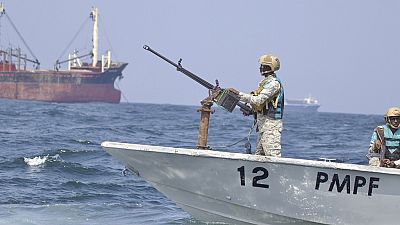Facebook Twitter (X) Instagram Somali Magazine - People's Magazine
A Chinese-owned fishing vessel, hijacked in late November off the coast of Somalia, is now being held in the Xaafuun district of Puntland. The pirates are demanding a $10 million ransom for the release of the ship and its 18 crew members, according to Somali officials. The hijacking has raised fresh concerns over maritime security in Somali waters, an issue that has plagued the region for years.
The vessel, previously licensed to fish in Puntland, saw its license expire before the hijacking. Reports indicate that the ship was boarded by pirates, and photos shared online reveal captives surrounded by armed men. Somali government officials, speaking on condition of anonymity, have refrained from providing further details regarding the ransom negotiations.
Increasing Risks in Somali Waters
This incident highlights the ongoing threat of piracy in Somalia, even though reported attacks have significantly decreased since their peak in 2011. During that time, over 160 piracy-related incidents were reported in Somali waters, prompting global intervention. The decline in attacks has been attributed to consistent naval patrols by international forces, including the European Union’s anti-piracy operation, Eunavfor Atalanta. However, this recent hijacking serves as a stark reminder of lingering vulnerabilities.
Eunavfor Atalanta classified the hijacking as “robbery at sea,” signaling the resurgence of pirate activities. This classification underscores the broader maritime security challenges facing Somalia, despite significant efforts to address them.
Response and Implications
The Somali government has not yet issued a formal statement on the incident. However, security analysts note that the attack comes amidst renewed efforts to stabilize the region. The hijacking could potentially disrupt international trade routes and create diplomatic strains, particularly given the involvement of Chinese interests.
For Somalia, the incident also reflects challenges in enforcing maritime regulations. The expired fishing license of the hijacked vessel raises questions about oversight and governance in Puntland. Analysts warn that lapses in such regulatory frameworks may embolden criminal groups operating in the region.
Historical Context of Piracy in Somalia
Piracy off Somalia’s coast has long been linked to the country’s instability and lack of centralized governance. At its height, Somali pirates targeted commercial vessels, demanding millions in ransom payments. These attacks disrupted global shipping routes and prompted significant international naval operations.
Though the frequency of piracy incidents has decreased, factors such as poverty, unemployment, and resource competition continue to fuel such activities. Experts caution that without sustained international and local efforts, the region remains susceptible to a resurgence in piracy.
Way Forward
To prevent future incidents, maritime experts emphasize the need for coordinated efforts between Somali authorities and international stakeholders. Strengthening local governance and providing economic opportunities for coastal communities could reduce reliance on piracy as a livelihood. Enhanced surveillance and patrolling of Somalia’s waters may also help deter such criminal activities.
This hijacking serves as a reminder of the complexities involved in securing maritime zones, particularly in politically fragile regions. While global efforts have yielded some success, incidents like this highlight the persistent challenges that require ongoing attention.

